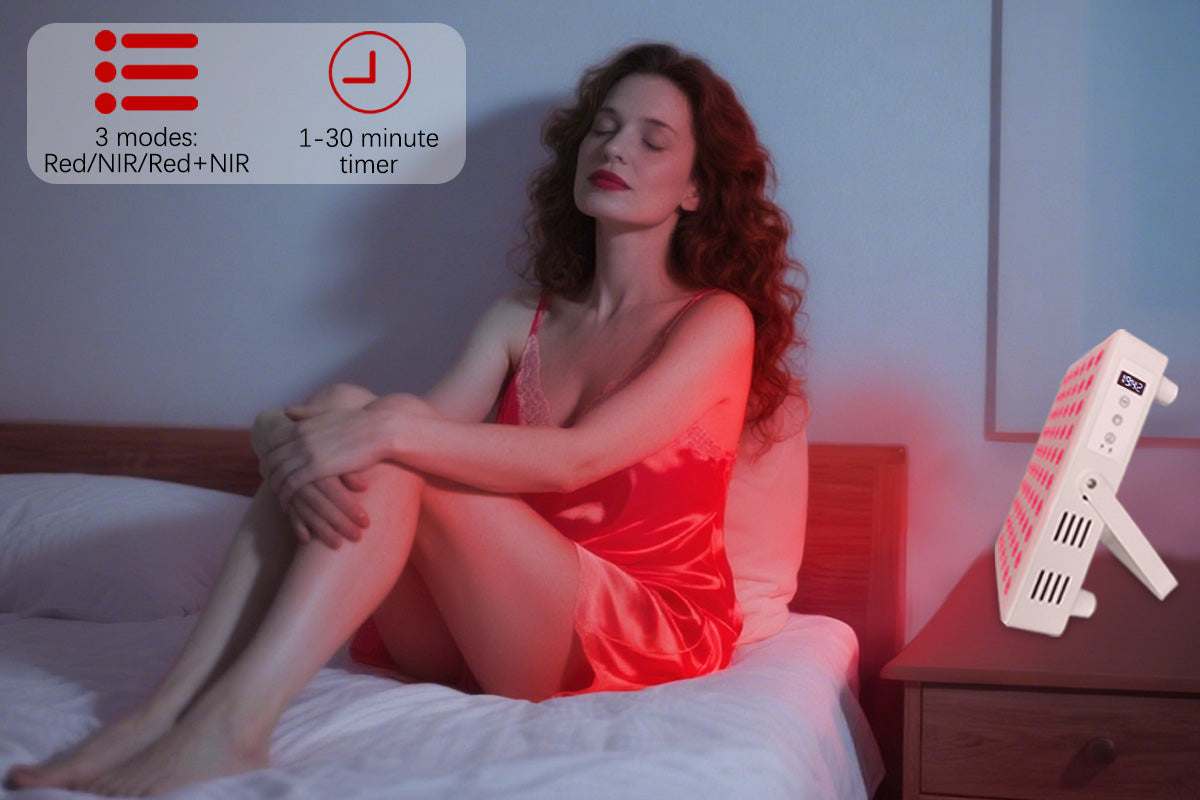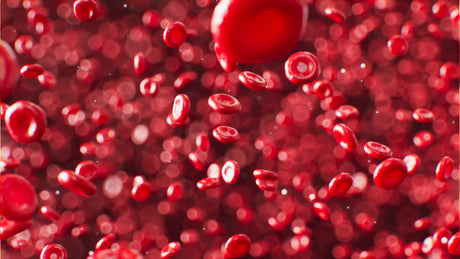How Red Light Therapy Works
Red light therapy operates primarily within the 600–850 nm wavelength range. These wavelengths penetrate the skin and are absorbed by the mitochondria, the energy centers of your cells. This interaction increases the production of adenosine triphosphate (ATP), enhancing cellular repair and regeneration.
Unlike UV light, red light does not damage the skin. Instead, it triggers anti-inflammatory processes, improves blood flow, and stimulates collagen production—making it ideal for treating everything from wrinkles to joint pain.
What to Look for in a Home Red Light Therapy Device
Before purchasing a red light therapy device, consider the following key features:
- Wavelength Range: Look for devices offering both 660nm (red light) and 850nm (near-infrared) wavelengths, which together provide deep and superficial benefits.
- Power Output (Irradiance): Higher irradiance means faster and more effective sessions. Aim for at least 100 mW/cm².
- Treatment Area: Choose based on your goals—handhelds for targeted treatment or full-body panels for holistic therapy.
- Safety and Certifications: FDA clearance, low EMF levels, and built-in timers are all essential for safe home use.
- Portability and Ease of Use: Compact designs with user-friendly controls make it easier to stick to your therapy schedule.
Top 10 Best Red Light Therapy Devices for Home Use in 2025
Below is our expert-curated list of the best red light therapy devices for home use this year:
1. Mito Red Light MitoPRO 1500
A professional-grade panel offering both red and near-infrared light. Excellent for full-body therapy and serious users.
- Pros: High irradiance, modular design
- Cons: Expensive and heavy
2. Joovv Solo 3.0
Backed by clinical research, Joovv’s third-generation device features smart controls, Wi-Fi, and modular expandability.
- Pros: FDA registered, app control
- Cons: Premium price
3. Hooga HG300
Perfect for beginners, offering 660nm and 850nm light with strong irradiance in a compact body.
- Pros: Affordable, strong output
- Cons: Limited treatment area
4. PlatinumLED Therapy Lights BIO Series
Among the most powerful on the market with the highest irradiance levels and dual-chip LED configuration.
- Pros: Extreme power, durable build
- Cons: Runs hot without adequate ventilation
5. RedRush 720
Compact, efficient, and EMF-free. Ideal for users focused on joint pain or spot treatments.
- Pros: Low EMF, easy to mount
- Cons: Smaller than panel alternatives
6. iRed Mini Pro
A pocket-sized powerhouse. Best for frequent travelers or those looking for spot treatment on the go.
- Pros: Ultra-portable, quick sessions
- Cons: Not suitable for full-body therapy
7. LightStim for Pain
One of the few FDA-cleared red light devices for pain relief. Ergonomic design makes it easy to use on joints and back.
- Pros: FDA approved, easy-to-use
- Cons: Focused on pain relief only
8. Kala Red Light Panel
A cost-effective choice that delivers powerful light therapy for skin and muscle health.
- Pros: Great value, easy mounting
- Cons: Limited tech features
9. Rouge Pro Panel
Great for athletes. Combines high irradiance with low EMF output and a rugged build.
- Pros: Professional-grade performance
- Cons: Bulky design
10. ReVive Light Therapy DPL II
Ideal for anti-aging and wrinkle reduction. Dual-panel design allows for versatile facial treatments.
- Pros: Easy setup, FDA-cleared
- Cons: Best for cosmetic use
Comparison Table of Top Devices
| Device | Wavelengths | Irradiance | Best For | Price Range |
|---|---|---|---|---|
| MitoPRO 1500 | 660nm + 850nm | 150 mW/cm² | Full-body | $$$$ |
| Joovv Solo 3.0 | 660nm + 850nm | 120 mW/cm² | Smart therapy | $$$$ |
| Hooga HG300 | 660nm + 850nm | 100 mW/cm² | Budget users | $$ |
| PlatinumLED BIO | 660nm + 850nm | 160 mW/cm² | Advanced users | $$$ |
| RedRush 720 | 660nm + 850nm | 110 mW/cm² | Compact use | $$$ |
| iRed Mini Pro | 660nm | 90 mW/cm² | Travel | $ |
| LightStim | Multiple | 85 mW/cm² | Pain relief | $$ |
| Kala Panel | 660nm + 850nm | 100 mW/cm² | Value seekers | $$ |
| Rouge Pro | 660nm + 850nm | 130 mW/cm² | Athletes | $$$ |
| DPL II | 660nm | 75 mW/cm² | Skin therapy | $$ |
Safety Tips and Precautions
-
Always wear protective eyewear during sessions.
-
Avoid overuse; most users benefit from 10–20 minutes per treatment area.
-
Consult a doctor if you are pregnant, have epilepsy, or are on photosensitizing medications.
Who Should Use Red Light Therapy at Home?
Ideal candidates include:
-
Athletes recovering from intense workouts
-
Individuals with chronic joint or muscle pain
-
People with skin concerns like acne, rosacea, or wrinkles
-
Those seeking mood support or improved sleep
Avoid use if you:
-
Have active cancerous lesions
-
Are prone to seizures
-
Are using certain medications without medical clearance
How to Use a Red Light Therapy Device Properly
-
Cleanse the area of skin to be treated.
-
Position the device 6–12 inches away.
-
Turn on the device and use it for 10–20 minutes.
-
Repeat 3–5 times per week, depending on your needs.
-
Track your results with photos and notes.
Real User Reviews and Testimonials
-
“The MitoPRO 1500 changed my skin in just three weeks. My wrinkles are visibly reduced.” — ★★★★★
-
“Joovv’s smart features help me stay consistent. It’s pricey, but worth it.” — ★★★★☆
-
“Hooga gave me all the benefits without breaking the bank.” — ★★★★★
Frequently Asked Questions
1. Is red light therapy safe for daily use?
Yes, when used correctly, red light therapy is safe for daily use. Limit sessions to 20 minutes per area.
2. How soon can I see results?
Some users notice changes within 2 weeks, but most need 4–6 weeks for visible results.
3. Does red light therapy help with hair growth?
Yes, several devices support hair follicle stimulation when used consistently.
4. Can it be used on pets?
Some red light therapy devices are safe for pets. Always consult a vet first.
5. What is the difference between red and near-infrared light?
Red light treats surface-level issues; near-infrared penetrates deeper for joint and muscle therapy.
6. Do I need to wear goggles?
Yes, always wear goggles to protect your eyes from direct exposure.
Conclusion
The best red light therapy devices for home use (2025 update) offer a blend of safety, performance, and convenience. Whether you're looking for skin rejuvenation, muscle recovery, or chronic pain relief, there's a device tailored to your needs and budget.
For full-body sessions, the MitoPRO 1500 and Joovv Solo 3.0 lead the pack. Budget-conscious users can turn to Hooga HG300 or Kala Red Light Panel for effective yet affordable therapy.
Start your red light therapy journey today—and glow from the inside out.
🔗 Learn more from the National Center for Biotechnology Information about red light therapy research.









